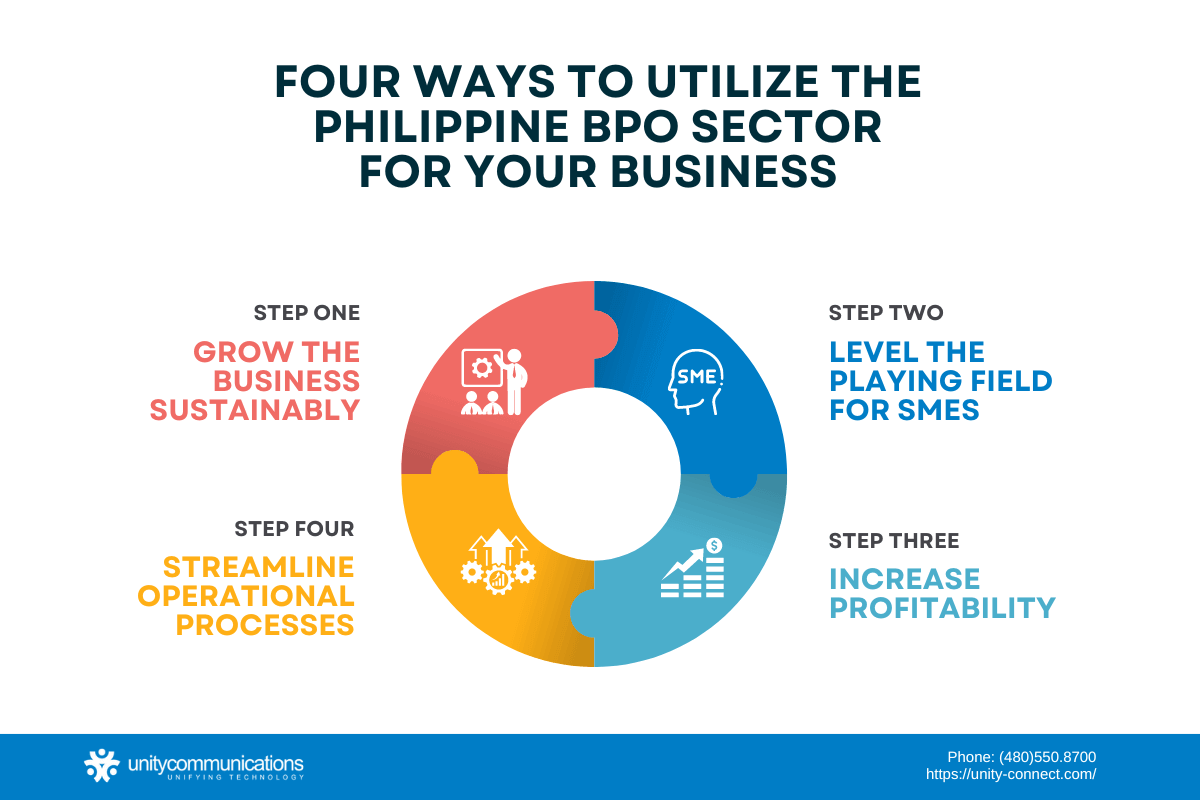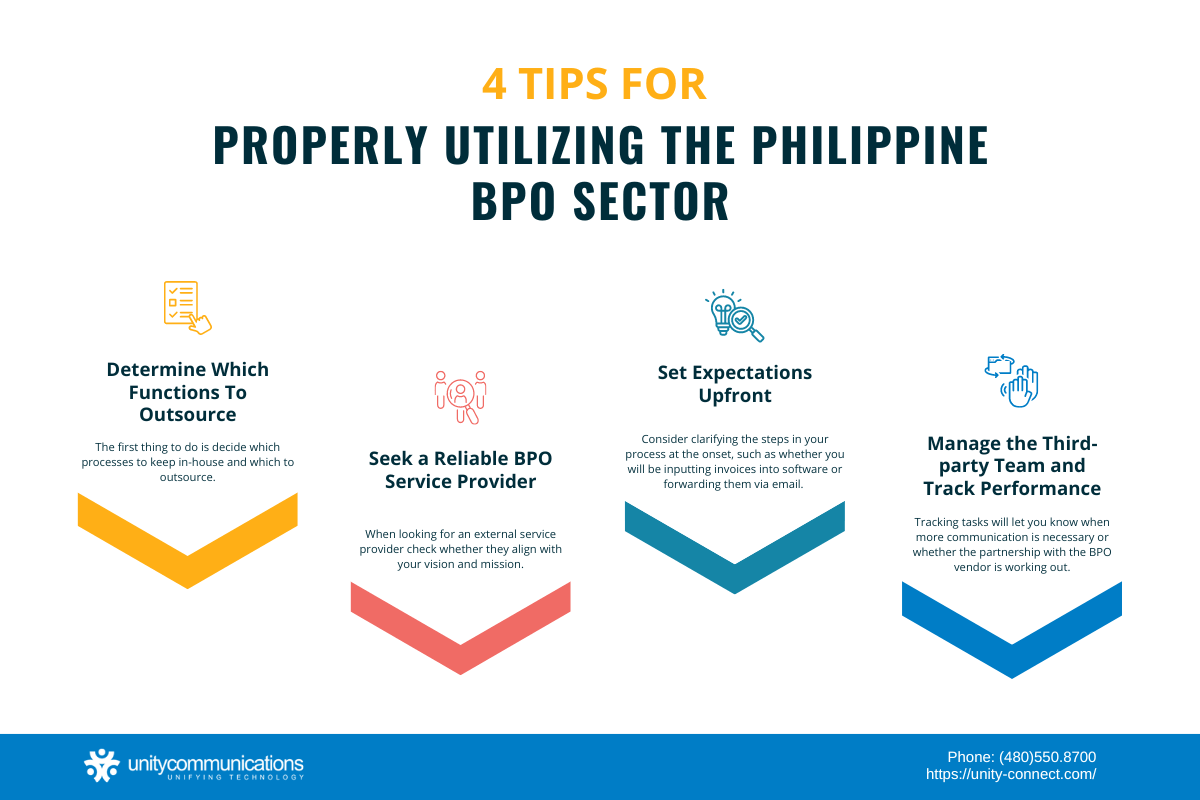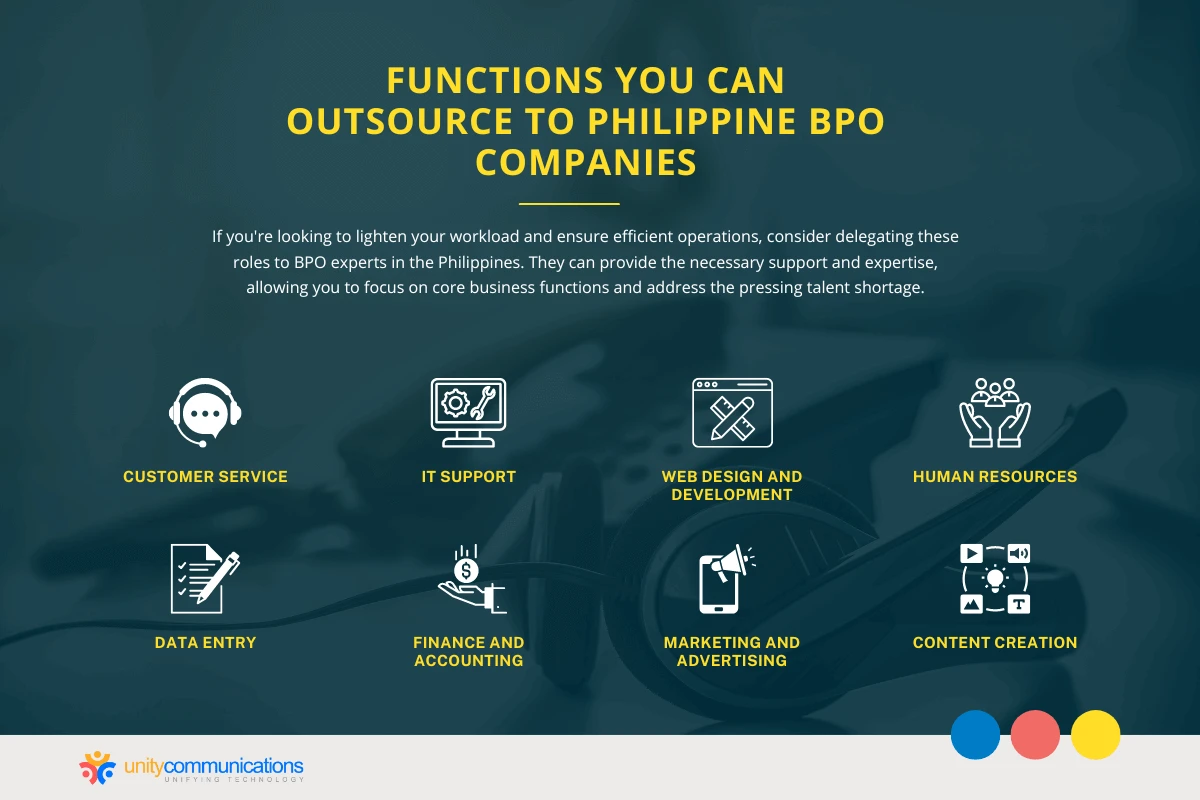Table of Contents
Finding the right offshoring provider in the Philippines lets you operate more efficiently and streamline business processes. Companies, especially small and medium ones, have various reasons to outsource to another country, including improving performance, avoiding hiring headaches, and saving money.
However, many decision-makers are unsure how to proceed with business process outsourcing (BPO). As such, they cannot use the strategy to their advantage.
Here is a guide on how to fully utilize the Philippine BPO sector. We explored some functions you can offload and shared tips on getting started.
Four Ways To Utilize the Philippine BPO Sector for Your Business

When running a small to mid-size enterprise (SME), you might notice that 24 hours a day is too short to accomplish your tasks. Without the budget or staff of a large corporation, you must work efficiently and concentrate on your core competencies or the work that only you can do.
Back-office outsourcing is your defense against time. In this section, we will discuss a few strategies to leverage the Philippine BPO sector and enhance the capabilities of your SME.
1. Grow the Business Sustainably
You can utilize outsourcing to focus on customers and allocate internal resources for growth. Here are some ways outsourcing to the Philippines can drive business growth:
- Bring more value for your money. Reputable outsourcing providers hire outstanding offshore talent at reduced fees. You need not stress recruiting, training, onboarding, and retaining staff because your BPO partner does the work for you.
- Lower rates on menial work. An offshore team can manage repetitive work such as data management and invoicing at a fraction of the cost of in-house staff. Having fewer internal teams also saves resources on office supplies and rent.
- Reduce employment costs. Offshore outsourcing cuts employment costs, such as recruitment, salary, and benefits, by 70%. You need not pay employment taxes or benefit packages. Plus, the BPO company shoulders the external staff’s office space, computers, and other overhead expenses.
- Save on equipment and infrastructure costs. Companies, especially those in e-commerce, require customer service help. Building an in-house contact center is resource-intensive, though. Tapping a service provider with the right hiring protocols, training, management process, and infrastructure already in place makes more sense.
Moreover, outsourcing allows you to delegate capital and resources to revenue-generating functions. The advantages of offshore outsourcing includes transferring time-consuming tasks to the offshore team while retaining in-house high-value functions, such as marketing and sales. You can also save on routine but essential tasks, such as accounting and bookkeeping.
Since you freed up resources for your core business, you can easily attract top performers for functions where higher compensation is crucial. These employees have a better chance of sticking with your organization in the long term. Lastly, you can allocate the money saved from outsourcing to developing new products or activities that grow your business.
2. Level the Playing Field for SMEs
As an SME, you have less capital to work with and fewer agents on the ground than large enterprises. Outsourcing is a great strategy to bridge the gap between your business and larger competitors, so long as you maintain control over the process.
The way to approach this is straightforward: treat your third-party contractors like you treat your in-house staff. Retaining control of external teams is one way to monitor your workforce and create a clear line of authority, which helps protect your business. Here is what you gain from maintaining control:
- Self-protection. Signing a contract and service-level agreement (SLA) is vital for providing both parties with legal securities. Establish clear payment terms with your BPO partner, clarifying how and when you will be billed, with terms for non-payment.
- Awareness of the workforce. Your remote contractors are just like your on-site employees—they have their quirks and concerns. Knowing the people you work with and how they operate will deliver better results. When you plan to outsource tech solutions and other services, analyze the BPO company and its culture.
- Channel of authority. Having a designated individual on your offshore team answers to helps you manage the outsourced tasks’ accuracy, quality, and quantity. Consider scheduling a regular review of your external staff to evaluate their performance and progress.
Life as an SME owner involves a constant battle against time—you do not have enough to accomplish everything you want to. Utilizing the Philippine BPO sector is an excellent way to take control of your time. Approaching it properly helps you reach your full business potential; approaching it incorrectly wastes time and money.
3. Streamline Operational Processes
Outsourcing is the perfect way to take back your time, allowing you to put your energy into work that you cannot offload. To fully capitalize on outsourcing, you must approach it correctly. That means making it the penultimate step in your streamlining process.
Here is a breakdown of your business streamlining process:
- Analyze. Assess where you spend the majority of your time to identify time-eaters. Use time-tracking software to locate the source of wastage.
- Eliminate. Identify the areas of your business pipeline that are no longer necessary, such as a two-stage review process, and remove them.
- Optimize. Assign tasks based on your employees’ skills and knowledge to get the most out of each process. Additionally, you can provide employees with software that makes tasks easier. For example, cloud software like Google Docs and Sheets makes collaboration more fluid.
- Automate. Search for applications and tools to accelerate the completion of certain tasks. For instance, you can use email marketing software to automate mailing, news aggregators to minimize the search for blog content, and social media apps to streamline content strategy.
- Outsource. Delegate tasks that a third party can accomplish more affordably. You can outsource to bots or people—whichever is the most ideal to do the work based on your established standards.
Businesses of varying sizes and sectors can tap into the Philippine BPO sector to regain time. Companies can use outsourcing cost-efficiently by looking at it as the logical step in a holistic streamlining process.
4. Increase Profitability
Outsourcing specific areas of an operation makes sense financially. Doing so helps business owners optimize profitability and reduce the amount of time they need to work. The money companies save by outsourcing can be reinvested in profit-generating projects.
The Philippines has a significantly lower minimum wage of $9.74/$10.42 per day than the $7.25 per hour in the U.S. To further illustrate the difference in labor costs, businesses can outsource AdWords pay-per-click (PPC) for as little as $5 per hour. Alternatively, they can outsource data entry for $3 to $7 per hour.
Suppose you are building a contact center team. On average, a contact center agent in the U.S. makes $42,888 annually. That figure excludes the cost of infrastructure and training. Here is a breakdown of the potential costs of an in-house team of four agents.
| Categories | Price |
|---|---|
| Salaries and benefits | $171,552 |
| Contact center manager | $65,459 |
| Hiring costs | $20,645 |
| Office space | $48,000 |
| Software and hardware | $3,600 |
| Total | $309,256 per year |
In total, you will be spending $309,256 annually to manage an in-house team. You can outsource the same team to the Philippines for as little as $8-$14. You only have to pay the service fee because the BPO company will shoulder rent, software, and other expenses.
Outsourced work often includes tasks outside of the main service that the company provides. These include administrative tasks such as data entry, social media updates, bookkeeping, and accounting. It is a no-brainer to outsource such tasks unless you enjoy doing them.
Four Tips for Properly Utilizing the Philippine BPO Sector

When utilizing the Philippine BPO sector, businesses must first learn the best practices. Conducting thorough research and extensive data gathering is vital before finalizing your decision.
As mentioned throughout this article, the Philippines is a great country to start your business process outsourcing journey. If you are ready to commence your BPO journey, follow the tips below.
1. Determine Which Functions To Outsource
The first thing to do is decide which processes to keep in-house and which to outsource. Companies typically outsource back-office tasks and specific areas of operations.
Businesses outsource back-office operations because these tasks do not help the company grow. While no one should neglect human resources, payroll, and accounting, such functions do not generate revenue or attract new clients. Although necessary, repetitive tasks only distract the in-house team’s attention.
You can also outsource work requiring specific talents or skills you lack in-house. These activities often have strict start and end dates and may require regular upkeep. For instance, a business owner can outsource web design and development instead of building and training an in-house information technology (IT) team.
You can only properly utilize outsourcing with clear objectives and structured processes. It works best when you know exactly what tasks you want to outsource and their requirements. Thus, you should take time to prepare.
2. Seek a Reliable BPO Service Provider
When looking for an external service provider, research the firm’s competencies and core values and check whether they align with your vision and mission. A clear plan for your company’s future helps you visualize the bigger picture.
Ask for help and support from your employees and co-workers when in doubt. Keep your communication line with them open throughout the process. Your colleagues can look objectively at the subject and provide opinions to help you decide.
The Philippine BPO sector is home to many service providers competing for your business, especially if you are prolific within your field. Do not be influenced by unnecessary services that the BPO firm may suggest as part of operational support.
A reliable outsourcing collaborator focuses purely on what your organization currently requires. This is where having a list of business goals and a project timeline becomes crucial.
Narrow your options to five service providers and weigh their strengths and weaknesses. Calculate how much each seat will cost once your offshore team is up and running. Never outsource processes and responsibilities that are too critical for the BPO firm to handle. When looking for a BPO provider, consider the following aspects:
- Industry experience. When choosing a service provider, check if the firm has extensive experience. A BPO company with proven industry experience knows how to deal with challenging situations. For instance, with technical support outsourcing providers, industry experience offers a competitive edge over companies with similar services.
- Testimonials and reviews. Read client reviews about your potential service provider. Take note of pain points that previous clients hinted at and where the vendor can improve. When the provider exceeds your expectations, consider giving them a positive review and thanking the department for a job well done.
- Value for money. The Philippine BPO sector can help with saving money and reducing overhead. Check how low you can reduce costs with your service provider’s help. Collect and use historical data to see where you spend most resources and ask them for suggestions.
3. Set Expectations Upfront
If you want to outsource bookkeeping to be free of the task, you need to partner with a firm with experience in your industry. Additionally, you should consider clarifying the steps in your process at the onset, such as whether you will be inputting invoices into software or forwarding them via email.
Try to be exact with your guidelines and expectations to guarantee an effective and seamless onboarding. This way, service providers can avoid bothering you with questions regarding basic tasks. If you want to outsource software development and be involved, you may also ask the provider to expect regular feedback and revision requests.
Finally, do not forget to specify the exact deliverables to leverage the Philippine BPO sector. Clarify what you will pay for and what the provider needs to deliver to accomplish the project. This is especially crucial for fixed-cost projects.
4. Manage the Third-party Team and Track Performance
Assign a point person who will interact with the offshore team. Their initial responsibility is to set expectations and familiarize the external team with your organization’s workforce and processes.
Depending on the outsourced work, you may need to give the offshore team limited access to your corporate network. If so, give them restricted permissions and limited viewing rights for security purposes. Other teams might only need to turn in their work via email.
To stay on top of progress and timelines, ask your service provider to use time-tracking software and give you access. Workers should track their time for each task to display their time efficiency.
Tracking tasks and deliverables will let you know when more communication is necessary or whether the partnership with the BPO vendor is working out.
Functions You Can Outsource to Philippine BPO Companies

The latest Upwork Future Workforce Report states that 60% of hiring managers struggle to fill vacancies with qualified talent. Some job openings are more in demand than others. The top roles hiring managers need to fill most urgently are Accounting (33%), IT and Networking (30%), HR (29%), Customer Service (27%), Admin Support (18%), and Software Development (14%).
As companies in the U.S. grapple with the labor shortage, many have decided to take an alternative route to address rising job vacancies. One particularly effective strategy is leveraging the Philippine BPO sector.
Businesses of varying sizes and industries are tapping Filipino providers for help with time-consuming functions or to access contact center as a service (CCaaS) solutions. Here are some roles you can easily delegate to BPO experts in the Philippines.
- Customer service. Customer service is one of the most commonly outsourced tasks to the Philippines, and businesses receive excellent service levels. Filipino agents can quickly and effectively handle foreign customers with tact and professionalism. Filipinos’ warm and friendly personalities enable them to instantly connect with consumers.
- IT support. This is another popular service that the Philippine BPO sector provides. An offshore IT team helps your network remain up-to-date with the latest technology and provides seamless, inter-departmental operations. The Philippines has many outstanding IT professionals ready to deliver quality solutions at a more affordable rate.
- Web design and development. Web development is one of the hottest sectors in the Philippines. Hence, companies can expect offshore teams to have the right skills and knowledge to complete digital projects.
- Human resources. SMEs build an offshore HR team to source talent, administer payroll, manage insurance, and pay employment taxes. A remote team in the Philippines minimizes fixed costs and improves efficiency with readily available infrastructure.
- Data entry. Outsourcing data entry services to providers improves efficiency, saves costs, and drives informed decisions. Filipino data entry specialists offer first-rate services that meet international requirements. The country implemented the Data Privacy Act of 2012 to ensure data security and privacy.
- Finance and accounting. You can tap the Philippine BPO sector for financial and accounting solutions. Such services are easier to outsource and have a higher chance of success because the vendor already has programs. Moreover, service providers offer flexible solutions that meet your needs and budget.
- Marketing and advertising. Businesses need a significant market presence to succeed. They need professionals who can plan marketing strategies on their behalf. Companies can employ a complete marketing team offshore for a reduced price and reinvest the savings into their next marketing campaign.
- Content creation. You need to develop massive content about your brand to reach a larger audience. This includes assets for blogs, websites, and social media. Hiring an offshore team can expedite your content creation. Besides, they could give you fresh perspectives and new ideas that resonate with the audience.
Due to the time difference with the West, brands planning to outsource to the Philippines can rely on stellar Filipino agents with 24/7 availability.
The Bottom Line
Imagine how helpful agile and lean operations would be if your goal is to expand and grow. By leveraging the Philippine BPO sector, you can work with expert professionals at lower costs.
Outsourcing is a significant decision and venture that you should approach with careful thought and planning, but, in the end, many find the results are worth it. Achieve greater operational efficiency, performance, and more by offloading non-core competencies and non-revenue-generating activities to a reliable BPO partner.
Let’s connect to discuss how Unity Communications helps your business achieve greater heights.




